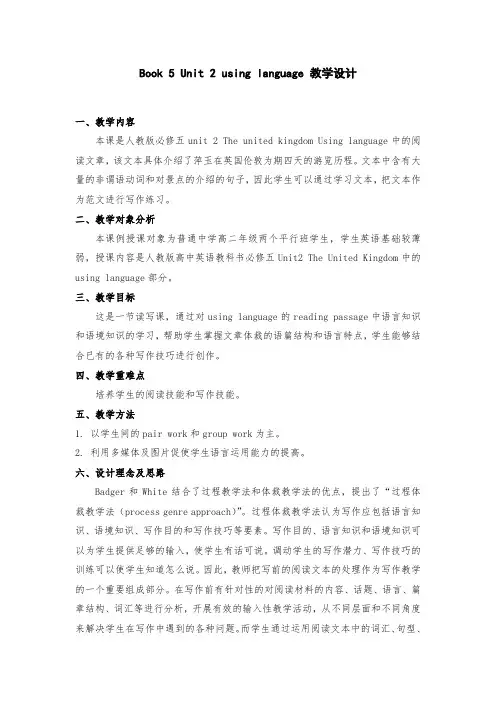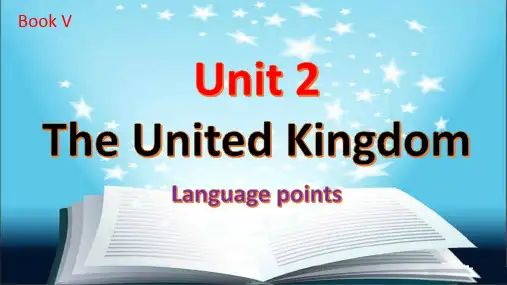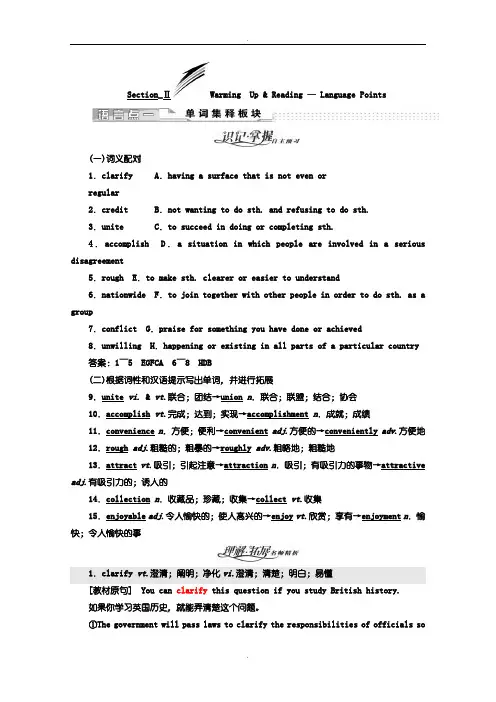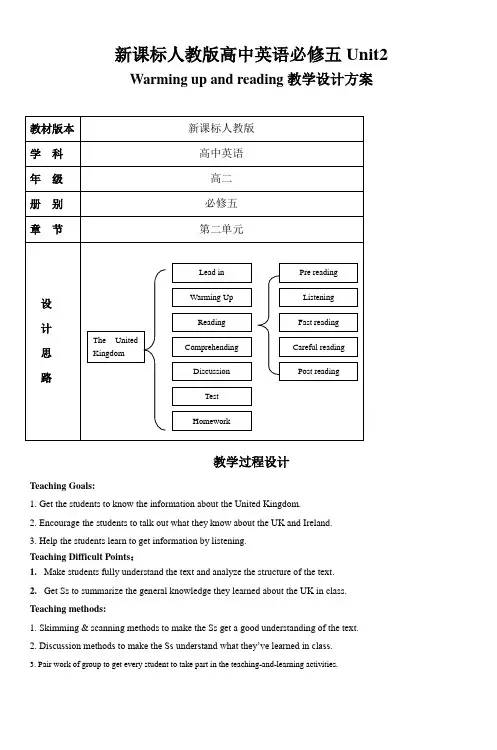人教课标版高中英语必修五 Unit2 Language Points 优秀教案-新版
人教版高中英语必修五第二单元教案

Period 5 GrammarThe General Idea of This PeriodThis period lays emphasis on grammar, that is, the past participle used as the object complement, which is also one of the difficult points in Senior English grammar.First, revise what the students have learnt in the last period by checking their homework , including some important phrases and translating some sentences from Chinese into English.In this unit the students should learn about the past particip le used as the object complement. First, the teacher presents one sentence containing a past participle used the object complement, which was taken from the reading passage.Teacher tries to analyze the function of the past participle and help the students have a general idea about it.Then the students are asked to find all the sentences that contain a past participle used as the object complement in the Reading passage.Then the students can come to a conclusion of the basic structure of the past participle1used as the object complement, that is, have/get/find/...+object +past participle.Next the teacher will explain the differences between the present participle and the past participle.The teacher compares them when are used as the attributive, predicate, object complement and adverbial.In order to do so, the teacher always shows some typical examples.After that, the students will find out the difference between them.Then they are provided with some exercises for them to consolidate what they have learned.In order to consolidate the grammar points, the students will do some oral practice.In this practice, the students will ask and answer some questions in pairs, using the past participle as the object complement.The students should not only learn about the grammar, but also learn how to use them, which is much more important.Also this part can help the students to communicate with each other using the language that they have learned, and this is the real purpose of learning the target languages.Teaching Important Point2Learn grammar: the past participle used as the object complement.Teaching DifficultiesKnow the differences between the present participle and the past participle when they are used as the attributive, predicate, object complement and adverbial.Learn to make a choice between the present participle and the past participle according to the different context.Teaching Aidsa tape recordera projectorthe blackboardThree Dimensional Teaching AimsKnowledge AimsLearn the past participle used as the object complement.3Know the differences between the present participle and the past participle when they are used as the attributive, predicate, object complement and adverbial.Ability AimsLearn to make a choice between the present participle and the past participle according to the different context.Learn to communicate with each other by using the language that they have learne d.Emotional AimsLearn to cooperate with each other.Teaching ProcedureStep 1 GreetingsTeacher greets the students as usual.Step 2 RevisionT: At the beginning of this period, let’s check your homework.First, please write down the4phrases according to the Chinese explanations.S: 1) 与……连结 be linked to2) 令某人惊讶的是 to one’s surprise3) 到处寻找, 观光 look around4) 睁大眼睛 keep one’s eyes open5) 在特殊的场合 on special occasions6) 为了纪念…… in memory of7) 拍一张照片 have a photo taken8) 展出 on show9) 为……感到骄傲 be proud of10) 遗留, 漏掉 leave outT: Good.Now, let’s check your translations of the five sentences.S1: When David Beckham arrived in Japan, the thrilled fans all went to meet him.5S2: In order to celebrate my cousin’s wedding, my aunt and uncle had an evening party arranged.S3: It is probably puzzling, but to set an example can help to clarify the puzzle.S3: Don’t be influenced by her words.You must decide for yourself.S4: Polar took the place of her father to treat the guests at the party, since her father was not available to.Step 3 Discovering Useful StructuresT: In the last unit we learnt about the past participle used as the attributive.Now let’s look at the following sentence taken from the passage.Please tell me what function is the past participle.Now when people refer to England you find Wales included as well.S: It is used as the object complement.T: You are right.So in this unit we will learn about the past participle used as the object complement.The structure is often formed with have /get /find/...+object +past participle.Please6find three more sentences from the reading passage with past participles used as the object complement.(After several minutes.)S1: To their surprise, the three countries found themselves united peacefully instead of by war.(Para.3)S 2: However, just as they were going to get Ireland connected to form the United Kingdom, the southern part of that country broke away to form its own government.(Para.3) S3: You find most of the population settled in the South, but most of the large industrial cities in the Midlands ad North of England.(Para.5)T: Yes, you are very clever.Now, look at Part 2 (Discovering useful structures) on Pages plete the sentences by using the words in brackets and the structure have /get /find something done.T: Let’s do No.1 as an example.We are having the house mended now.7(After several minutes.)S1: No.2 You look different today.Have you had your hair cut?S2: No.3 Do you want to get the dictionary delivered to your house or would you prefer to come to the shop for it?S3: No.4 Sorry, I haven’t had the film developed yet.S4: No.5 On my way to the station my car broke down.When I got to the repair shop I found it closed.S5: No.6 The computer doesn’t seem to work well.You’d better get it repaired.S6: No.7 Jill and Eric had all their money stolen while they were on holiday.S7: No.8 Chris had some flowers sent to Sarah on her birthday.Then Chris asked Sarah to marry hem and they had it announced in the newspaper.They had no time to arrange their own wedding, so they had it organized by a company.T: Ex cellent.Past participle used as the object complement can also be put after such words8as see, hear, notice, watch, keep, make, feel, etc.Please put the following sentences into English.1.她高兴地看到孩子们在托儿所受到很好的照顾。
人教版高中英语必修五教案:Unit+2+using+language.doc

Book 5 Unit 2 using language 教学设计一、教学内容本课是人教版必修五unit 2 The united kingdom Using language中的阅读文章,该文本具体介绍了萍玉在英国伦敦为期四天的游览历程。
文本中含有大量的非谓语动词和对景点的介绍的句子,因此学生可以通过学习文本,把文本作为范文进行写作练习。
二、教学对象分析本课例授课对象为普通中学高二年级两个平行班学生,学生英语基础较薄弱,授课内容是人教版高中英语教科书必修五Unit2 The United Kingdom中的using language部分。
三、教学目标这是一节读写课,通过对using language的reading passage中语言知识和语境知识的学习,帮助学生掌握文章体裁的语篇结构和语言特点,学生能够结合已有的各种写作技巧进行创作。
四、教学重难点培养学生的阅读技能和写作技能。
五、教学方法1. 以学生间的pair work和group work为主。
2. 利用多媒体及图片促使学生语言运用能力的提高。
六、设计理念及思路Badger和White结合了过程教学法和体裁教学法的优点,提出了“过程体裁教学法(process genre approach)”。
过程体裁教学法认为写作应包括语言知识、语境知识、写作目的和写作技巧等要素。
写作目的、语言知识和语境知识可以为学生提供足够的输入,使学生有话可说。
调动学生的写作潜力、写作技巧的训练可以使学生知道怎么说。
因此,教师把写前的阅读文本的处理作为写作教学的一个重要组成部分。
在写作前有针对性的对阅读材料的内容、话题、语言、篇章结构、词汇等进行分析,开展有效的输入性教学活动,从不同层面和不同角度来解决学生在写作中遇到的各种问题。
而学生通过运用阅读文本中的词汇、句型、语篇结构,结合各种写作技巧进行写作,不仅加深了对阅读文本的理解;还拓宽了思维,提高了语用能力,形成一种以读促写的良性循环模式。
人教版高中英语必修五Unit2Languagepoints1课件新

break v. (broke, broken) <习惯搭配>:
break away 破坏、出故障、分解、脱离 break down 抛锚,出故障,身体跨了,削弱 break into 闯入,突然发出 break out (战争、瘟疫、火灾)爆发 break off 中断 break the rules 违反规则 break the records 打破记录
如果你学习了英国历史,很容易就能弄清楚 任何问题。
clarifyvt.澄清,讲清楚;阐明 vi. 澄清,清
楚,明了;易懂事
Could you clarify the question?
你能解释这个问题吗?
His mind suddenly clarified.
他的头脑突然清醒了.
拓展:clarification n.
attractionn. 1) 吸引,引力;2)吸引人
的东西;喜闻乐见的东西;精彩节目
attractiveadj. 有吸引力,诱人的
attraction of gravity 重力
He can’t resist the attraction of the sea on hot day. 酷热的夏天他经不住海的诱
疾病侵袭身体.
Holiday makers invade the seaside towns in summer.
在夏季,度假者大批涌入海滨城市.
Homework:
To Finish Exercise 1 & 2 on page 11. Find sentences with past particles in the text and get prepared for grammar study.
人教新课标必修五Unit2TheUnitedKingdomLanguagePoints课件

Homework
1.Preview the reading on page 2 2. Finish the exercise on page 2
Thank you! See you tomorrow!
2. England can be divide into three main areas.
英国可以分成三大部分.
divide into 把…分成 divide… by… 用…除以
The teacher divided the students into several groups.
18 divided by 3 is 6. So 18 can be divided by 3.
辨析:divide, separate
divide 划分;把整体分成若干部分,破坏了宾
语的完整性.
separate 分隔;把本来连在一起或靠近的分隔
开来,没有破坏其完整性,只是将其分开.
The world is divided into five continents.
Let’s divide the cake into three.
为…带来荣誉;值得赞扬 to one’s credit
为方便起见
for convenience
省去;遗漏;不考虑
leave out
LanguageБайду номын сангаасpoints
1. How many countries does the UK consist of? 大不列颠由多少个国家组成?
consist of 由…组成,由…构成,包括
1. It was a pity that our car broke down on the
人教版高中英语必修5教师用书:Unit 2 Section_Ⅱ Warming Up - Reading — Language Points (含答案)

Section_ⅡWarming Up & Reading — Language Points(一)词义配对1.clarify A.having a surface that is not even orregular2.credit B.not wanting to do sth. and refusing to do sth.3.unite C.to succeed in doing or completing sth.4.accomplish D.a situation in which people are involved in a serious disagreement5.rough E.to make sth. clearer or easier to understand6.nationwide F.to join together with other people in order to do sth. as a group7.conflict G.praise for something you have done or achieved8.unwilling H.happening or existing in all parts of a particular country 答案:1~5 EGFCA 6~8 HDB(二)根据词性和汉语提示写出单词,并进行拓展9.unite vi. & vt.联合;团结→union n.联合;联盟;结合;协会10.accomplish vt.完成;达到;实现→accomplishment n.成就;成绩11.convenience n.方便;便利→convenient adj.方便的→conveniently adv.方便地12.rough adj.粗糙的;粗暴的→roughly adv.粗略地;粗糙地13.attract vt.吸引;引起注意→attraction n.吸引;有吸引力的事物→attractive adj.有吸引力的;诱人的14.collection n.收藏品;珍藏;收集→collect vt.收集15.enjoyable adj.令人愉快的;使人高兴的→enjoy vt.欣赏;享有→enjoyment n.愉快;令人愉快的事1.clarify vt.澄清;阐明;净化vi.澄清;清楚;明白;易懂[教材原句] You can clarify this question if you study British history.如果你学习英国历史,就能弄清楚这个问题。
新课标人教版高中英语必修五Unit2

新课标人教版高中英语必修五Unit2Warming up and reading教学设计方案教学过程设计Teaching Goals:1. Get the students to know the information about the United Kingdom.2. Encourage the students to talk out what they know about the UK and Ireland.3. Help the students learn to get information by listening.Teaching Difficult Points:1.Make students fully understand the text and analyze the structure of the text.2.Get Ss to summarize the general knowledge they learned about the UK in class. Teaching methods:1. Skimming & scanning methods to make the Ss get a good understanding of the text.2. Discussion methods to make the Ss understand what they’ve learned in class.3. Pair work of group to get every student to take part in the teaching-and-learning activities.Teaching procedures:Step One: Lead inAsk Ss the question “Where will the 2012 Olympic Games be held?”.Get the answer: LondonStep Two: Warming upShow Ss some pictures of the United Kingdom and ask them some questions about the UK. Then Check the answers to the quiz. Introduce the UK by showing pictures while Ss giving the correct answers.Step Three: Reading:1. Pre-readingQ: What are the four countries of the UK ?What are the capital cities of the countries of the UK?What are the three main areas in England?Get Ss to come up to tell their location on the map ( showed on screen)2. Fast-readingScan the text and match the following.3. Careful-reading:Divide the passage into three parts and write down the main ideas of each part.4. Post-reading:Answer the questions.Step Four: comprehendingplete the sentences using the words in the box.2.Answer the questions.Step Five: DiscussionCan you work out why London is the capital of England, Great Britain and the UK?Step Six: TestPut each town or city into its correct zone according to the reading text.Homework:Read the text again and find out some words, expressions and sentence structure that seem difficult to you.。
人教课标版高中英语必修5 Unit2_Using_Language_Reading_公开课教学设计
Unit2 Using Language Reading公开课教学设计Unit2 The United KingdomUsing language Reading:Sightseeing in London一、教学内容分析本节课是人教版《普通高中课程标准实验教科书—英语(必修)5》第二单元第四课时的语言运用部分。
第一课时是Warming up和Reading ”Puzzles in Geography”,Comprehending 其主要目标是初步了解英语的地理、历史、政治和文化等。
第二课时是Learning about Language,其主要目的是深化学习本单元出现的重点单词和短语的用法。
第三课时是本单元的语法项目:过去分词作宾语补足语。
本节课是第四课时,重在加强对学生的读、说、写综合语言能力的培养,同时提高他们用英语获取信息、解决问题的能力,为他们提供充分地表现空间,激发他们积极主动去学习,也为了增强他们的合作意识。
在设计这节课时,教师大胆地将这一课时内容呈现改编,补充了一下学习资源,删除了教材中的Speaking and writing的内容,而将听、写的活动融入到阅读过程中,使之更加适合学生实际,符合学生实际。
阅读材料Sightseeing in London主要介绍英国伦敦的八个名胜古迹,本节课在提高学生的阅读理解能力的基础上,增强他们的文化意识,培养跨文化交际理解能力。
二、学情分析通过本单元第一课时学生通过阅读说明文Puzzles in Geography,了解到英国历史演变的过程、英国国土面积、英国区域划分、受外来侵略的文化影响、罗马人留下的城镇和道路、盎格鲁-撒克逊人留下了语言和政体斯堪的纳维亚人留下的词汇和北部地名、诺曼人留下的城堡和食物名称,特别是英国伦敦是英国历史珍宝的汇集地,有众多的博物馆、艺术收藏馆、剧院、公园和古代建筑物,这为本课学习奠定了基础。
在语言知识方面,前三节课已经学习了关于英国文化的一些词汇,了解了一下文化方面的背景知识,为本课学习做好铺垫。
人教版高中英语必修五:Unit+2教案+
Unit 2 warming up, listening, speaking内容的教学设计一、设计思想笔者把“以新课程理念为先导,以师生共同发展为根本,以课堂教学改革和创新为核心”作为本课教学内容设计的指导思想,把建构主义理论作为本课教学设计的理论依据。
本课的设计特色为:紧扣“英国的地理构成和旅游景点”,自然过渡,层层递进,以任务设计和真实情景为教学载体,全面发展学生的语言综合素质。
笔者从单元整体教学的角度出发,本着提高课堂教学效率的原则,对教材内容大胆地加以删减和整合。
本课是本单元的第一课时,笔者将重点放在了英国的地理构成和旅游景点上,这样能使学生对本单元的主体教学内容有大致的了解,也为后续课文内容的深入打下基础。
由于教材中的listening和speaking部分均和历史内容联系颇多,笔者故将其放在第一篇阅读文章结束后再行处理。
二、教材分析根据《普通高中英语课程标准》(实验)的要求,教师在设计本课教学任务时,要根据教学目标和学生的实际水平,通过设计和实施各种教学活动提高学生的语言运用能力,培养学生的自主学习、合作探究的学习策略,发展学生的听、说、写的语言技能。
Unit2 The United Kingdom是新课标高中英语第二册的第二个单元。
本单元教学内容主要由两大块阅读材料组成:英国的历史沿革及英国的旅游景点。
因而本单元的教学一方面为学生熟悉和了解英国这个国家的地理、历史、文化等知识提供了一个学习的平台,另一方面也对培养学生的跨文化意识起到了积极的促进作用,是一个有着重要意义的学习模块。
三、学情分析高二学生有一定的英语语言学习基础和英美国家概况的基本知识,有明确和持续的学习动机和自主学习意识,能够理解口头或书面材料中表达的观点,提出问题并陈述自己的意见和建议。
能够在教师的帮助下策划、组织和实施英语学习活动,但口语表达、信息重组的能力上还略显薄弱。
在本课教学中学生可能采用的学习策略有:自主学习,合作探究、信息整合、有效交际。
新课标人教版必修五Book5 Unit2 Language points
• 复习refer to • 1) When I said someone was stupid, I wasn’t referring to you.( 指的是) • 2) The man referred to just now by him was our manager. (提到,谈到) • 3) When you come across new words, you can refer to the dictionary. (查阅)
2.最后,英国政府打算于20世纪初把爱尔兰也同另外三个国家和 平联合起来以形成联合王国。
Finally,the English government tried in the early twentieth century to form the United Kingdom by getting Ireland connected in the same peaceful way.
• ①I want to buy a house, one with a large garden. 我想买一座房子,一座带有大花园的房子。 • ②The little boy doesn't like this apple; he wants the red one. 小男孩不喜欢这个苹果,他想要那个红的。 ③I bought some new chairs. The old ones should be thrown away. • 我买了新椅子,那些旧的也该扔了。 ④The bike is cheaper than that made in our factory. 这自行车比我们厂生产的要便宜。(=the one) • ⑤The population of China is larger than that of Japan. 中国的人口比日本的多。(不用 the one 代替) ⑥The cars made here are better than those made in my hometown. • 这里生产的小汽车比我家乡生产的好。 ⑦—Who is the person that shook hands with the foreigners? • 那个和外宾握手的人是谁? — It is our headmaster. 他是我们的校长。
人教版英语必修五Unit 2(Using language)教学课件(共25张PPT)
She finished the day by looking at the museum in the Forbidden City.
4.What interested her most was......
eg.使他最感兴趣的是被古代名画家所作的古画
What interested him most was some paintings drawn by famous painters in ancient time.
• 2 ..........
Last Paragraph
1. I hope all of you will enjoy yourselves here. 2. .........
Homework
• 1 Recite the sentences learnt today
• 2 Finish the composition with the sentences learnt today
15、_c_o_m__m_u__n_i_sm__ n.
共产主义
16、__o_r_i_g_in__a_l_ adj 最初的;原始的;独创的
17、___t_h_r_i_l_l __ vt.
使激动;使胆战心惊
18、____p_o_t____ n.
罐;壶
19、___e_r_r_o_r___ n.
错误;过失
20、___t_e_n_s_e___ n.
1 .....had remained standing for .....years. • eg. 长城已经矗立了上千年。
The Great Wall had remained standing for thousands years
- 1、下载文档前请自行甄别文档内容的完整性,平台不提供额外的编辑、内容补充、找答案等附加服务。
- 2、"仅部分预览"的文档,不可在线预览部分如存在完整性等问题,可反馈申请退款(可完整预览的文档不适用该条件!)。
- 3、如文档侵犯您的权益,请联系客服反馈,我们会尽快为您处理(人工客服工作时间:9:00-18:30)。
Unit2 Language Points教案Teaching Aims:Learn expressions & phrasesLearn language pointsTeaching Important Points:Language pointsTeaching Difficult Points:Have /get sth. DoneTeaching Methods:Presentation & PracticeTeaching Procedures:Step I RevisionRetell the passage.Step II. Expressions & phrasesExpressions & phrases (1)consist of 由…组成divided into 分开There is no need (for sb.) to do…debate about sth. 为…争辩(争论)refer to 提及,谈到connect to /link to 连接as well (as ) 也,还有to one’s (great) surprise 使…吃惊find sb./ sth. done (doing) 发现某人(物)处于某种状态下get sb. / sth. done11. break away (from) 挣脱12. break down (机器、车辆)坏13. for convenience 为了方便14. be known as/ for /to /by15.keep one’s eyes open 睁大眼睛16.make sth. worthwhile 使… 值得17.leave out 省去;遗漏;不考虑18. find out 发现19. on the phone 在电话里20. be on holiday 在度假21. in memory of 为了纪念22. leave for 动身去某地23. ring out 发出响声,响起24. make a list of 列出…的清单25. pass through 通过26. be on show 在展出27. take the place of 代替,取代28. remain doing 仍然在做…29. on (special) occasions 在(特殊)场合30. feel / be proud of 为…而自豪31. fall asleep 睡觉Step nguage Pointsconsist of =be made up of 由….组成(没有进行时)eg: The UK consists of Great Britain and Northern Ireland.=Great Britain and Northern Ireland make up the UK.The soup consists of tomatoes, meat and peas. consist in = lie in 存在与;在于(无被动形式)eg: The beauty of air travel consists in its speedand ease.consist with: 一致The report consists with facts.2. 区别:separate …from (把联合在一起或靠近的人或物分离出来)divide…into 把…分开(把整体分为若干部分)eg: The teacher divided the class into two groups.eg: The Taiwan Strait separates Taiwan from Fujian.As we joined the big crowd, I got ______ from my friends.A. separatedB. sparedC. lostD. missed3. There is no need to do sth 没必要做某事eg: There is no need for you to help him.There is no need to worry at all.4. debate about sth.eg. They debate about the proposal for three days.debate /argue/ quarrel5. clarify: vt./vi. (cause sth. to )become clear or easier to understand 澄清;阐明;清楚;明了eg. I hope what I say will clarify the situation.Can you clarify the question?6. be linked to = be connected to /be joined toThis wire connects _____ that one.A. withB. toC. ofD. on7. refer to提及,指的是…eg: When he said “some students”, do you think hewas referring to us?2) 参考;查阅;询问eg: If you don’t understand a word you may refer toyour dictionaries.Please refer to the last page of the book foranswers.3) 关系到;关乎eg: What I have to say refers to all of you.This rule refers to everyone.It was foolish of him to _____ his notes during that important test, and as a result, he got punished.stick to B. refer to C. keep to D. point to reference: n. reference book8. join A to B /link A to B 把A和B连接eg: The Channel Tunnel will join Britain to Europeby road.9. included /including10. name: n. v.11. to one’s surprise(prep)“to one’s +名词” 表“令某人…”常见的名词有“ delight, disappointment, enjoyment; astonishment 等eg: I discovered, to my horror, that the goods were entirely unfit for sale.To John’s great relief they reached the house atlast.12. …found themselves united peacefully“find +宾语+宾补( adj; adv; v-ing; pp; 介词短语;不定式)”eg: A cook will be immediately fired if he is found smoking in the kitchen.You’ll find him easy to get along with.They found themselves trapped by the bush fire.When I woke up, I found myself in hospital.I called on him yesterday, but I found him out.13. get sth done =have sth done 使某事被做eg: I'll just get these dishes washed and then I'llcome.get + n. + to doget + n. + doingeg. You’ll get her to agree.l’ll get the car going.get done: 用于意想不到、突然或偶然发生,意为“被….”Be careful when you cross this very busy street.If not, you may _____ run over by a car.A. haveB. getC. becomeD. turn14. break away (from sb / sth) 脱离;破除…eg: It is not easy for him to break away from badhabits.The man broke away from his guards.break down (会谈)破裂,失败;(汽车等)出故障;(人的健康状况)变得恶劣;(情感)失控eg. His car broke down on the way to work thismorning.His health broke down under the pressure of work.He broke down and wept when he heard the news.Talks between the two countries have completelybroken down.区别:break in 闯入;打岔break off 中断,折断break into 闯入break out 爆发;发生break up 驱散;分散,拆散News reports say peace talks between the twocountries_____ with no agreement reached.A. have broken downB. have broken outC. have broken inD. have broken up15. as well as 不仅…而且; 既…又…eg: He is a teacher as well as a writer.The children as well as their father were seen playing football in the street.16. relation: 关系;亲戚eg. The cost of this project has no relation to theresults.He is a close relation of mine.17. convenience: n.方便;便利We bought this house for its convenience.convenient: adj.be convenient to sb.come and see me whenever ___________.you are convenientB. you will be convenientC. it is convenient to youD. it will be convenient to you.18. be known as 作为…(身份)出名be known for 因…而出名be known to 为…所知be known by 根据… 得知eg: Fu Biao is known to everyone as a good actor.He was known for his frankness.19. attraction:un. 1). 吸引;引力cn. 2). 吸引人的东西;喜闻乐见的东西;精彩节目Eg. attraction of gravitation 重力He can’t resist the attraction of the sea on a hotday.A big city offers many and varied attractions.What are the principle attractions this evening? attract : v.attractive: adj.unattractive: adj.attractively: adv.20. influence(v) 对…产生影响eg: What influence you to choose a career in teaching?2) (可数n) 产生影响的人或事eg: He is one of the good influences in the school.3) (不可数n) 影响eg: A teacher has great influence over his pupils. 21. invader: n. 入侵者;侵略者invade: vt. 侵入;侵略;挤满;涌入eg. Doubts invade my mind.Disease invades the body.22. evidence (不可数n) 证据;迹象a piece of evidence 一项证据eg: He got many pieces of evidence from the internet for his theory.evidence: 指谋事的真伪proof: 指令人信服的、无可置疑的证据There wasn’t enough ________ to prove him guilty. His fingerprints were ________of his guilt.23. keep one’s eyes open 睁大双眼24. Which country is left out?*leave out: 省略;遗漏;排除eg: Do you know which word in this sentence has been left out?Don’t leave me out when you’re giving out the invitations!25. take the place of 取代,代替=take one’s place / replacein place ofinstead of insteadgive place to 让位于…in place / out of place 在适当/ 错误的位置a place of interestStep VI Homework assignment。
